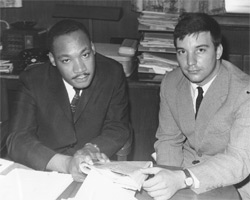Sep 5, 2008
 Back in 1961, Gurdon Brewster was a seminary student at Union Theological Seminary, training to be an Episcopal priest. When this Northern liberal raised his hand to volunteer as a summer intern at Ebenezer Baptist Church, he had no idea what lay in store for [...]
Back in 1961, Gurdon Brewster was a seminary student at Union Theological Seminary, training to be an Episcopal priest. When this Northern liberal raised his hand to volunteer as a summer intern at Ebenezer Baptist Church, he had no idea what lay in store for [...]
Read the Full Article

Already a subscriber? Login